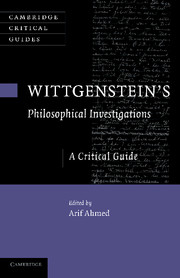Book contents
- Frontmatter
- Contents
- List of contributors
- Acknowledgments
- Introduction
- 1 From referentialism to human action: the Augustinian theory of language
- 2 What's doing? Activity, naming and Wittgenstein's response to Augustine
- 3 Measure for measure? Wittgenstein on language-game criteria and the Paris standard metre bar
- 4 Wittgenstein on family resemblance concepts
- 5 Wittgenstein on concepts
- 6 Wittgenstein vs contextualism
- 7 Wittgenstein and the linguistic turn
- 8 Rorty's Wittgenstein
- 9 Are meaning, understanding, etc. definite states?
- 10 Another strand in the private language argument
- 11 Deductive inference and aspect perception
- 12 Remembering intentions
- Bibliography
- Index
4 - Wittgenstein on family resemblance concepts
Published online by Cambridge University Press: 06 July 2010
- Frontmatter
- Contents
- List of contributors
- Acknowledgments
- Introduction
- 1 From referentialism to human action: the Augustinian theory of language
- 2 What's doing? Activity, naming and Wittgenstein's response to Augustine
- 3 Measure for measure? Wittgenstein on language-game criteria and the Paris standard metre bar
- 4 Wittgenstein on family resemblance concepts
- 5 Wittgenstein on concepts
- 6 Wittgenstein vs contextualism
- 7 Wittgenstein and the linguistic turn
- 8 Rorty's Wittgenstein
- 9 Are meaning, understanding, etc. definite states?
- 10 Another strand in the private language argument
- 11 Deductive inference and aspect perception
- 12 Remembering intentions
- Bibliography
- Index
Summary
One of Wittgenstein's best-known and most important philosophical contributions in the Philosophical Investigations is his account of the ‘family resemblance’ (Familienähnlichkeit) character of general concepts (PI 65ff.).
He introduces this account at PI 65 in response to an objection which he notes might be raised against his preceding descriptions of various sorts of language-games: that they have failed to specify ‘the general form of propositions and of language’ (as the Tractatus had attempted to do with its ‘picture theory’ of propositions). More precisely, he invokes the family resemblance character of the terms ‘proposition’ and ‘language’ in order to defuse this objection by showing that it rests on a mistaken assumption about how such terms work. However, the significance that he accords to his account of family resemblance concepts actually extends far beyond its bearing on this particular problem (important though that may be). Accordingly, this chapter will consider his account in something more like the full range of its significance.
His overall account seems to me both more philosophically interesting than has usually been realized and in certain ways more problematic. It is philosophically interesting because it carries original, dramatic implications for a broad range of fundamental philosophical issues. It is problematic because it contains several confusions that need to be identified and corrected if it is to emerge with the full force of which it is capable (this is often the case with philosophers' most important contributions).
Keywords
- Type
- Chapter
- Information
- Wittgenstein's Philosophical InvestigationsA Critical Guide, pp. 66 - 87Publisher: Cambridge University PressPrint publication year: 2010
- 9
- Cited by



